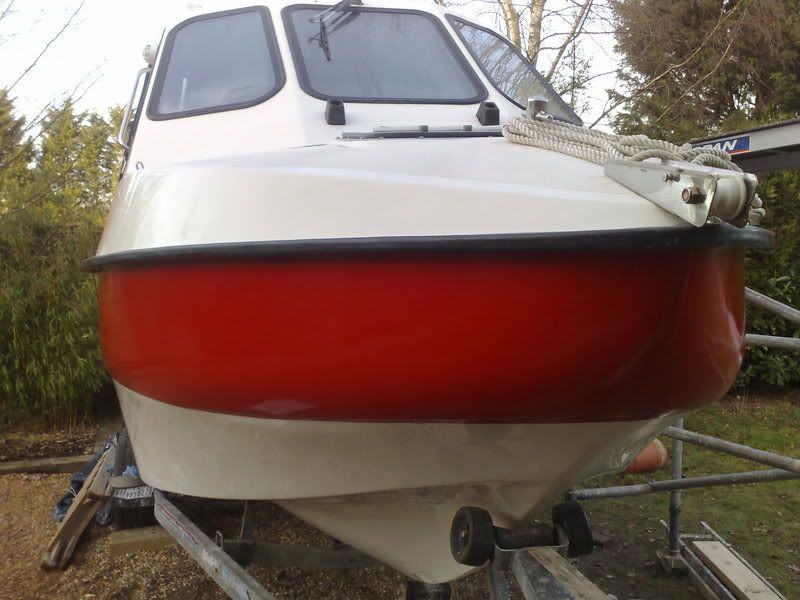Neil
crew member
  'Boat that never leave pond never know wonder of ocean'
'Boat that never leave pond never know wonder of ocean'
Posts: 70
|
Post by Neil on Jan 2, 2007 6:25:53 GMT
Found some more info for the board.
DECARBING
Outboards are probably the most abused engines ever.
An incorrectly propped engine is the norm, not the exception. That incorrect propping results in carbon build up. It has nothing to do with lead.
Think about it. Some folks dole around at trolling speeds or non-planing speeds for hours. That leads to serious deposit build up. Add oil in the fuel and you get the problem described.
Engines that run at high speeds for most of their lives may never have the issue.
However, a decarb does NOT hurt anything, except maybe the plugs, and is a good preventive maintenance practice.
BTW, the decarb. process has nothing to do with gunked up carburetors. That's a fuel storage issue best dealt with using fuel stabilizers
If Your intent is to REMOVE the existing carbon buildup from the cylinders, heads, and rings, a spray decarb solvent product, such as SeaFoam Deep Creep, Power Tune, or Ring Free, is needed to do the decarb process. Free moving rings are what seals your cylinders and gives you compression. Compressed and stuck rings means loss of compression, broken rings, damaged pistons and heads, and eventually, engine failure.
Run engine at fast idle, with engine running and warm, slowly spray liberal amount into each carb. Its gonna smoke up the place.
Spray for a couple minutes, now spray a larger amount into the carb(s) until engine chokes out and stops.
Remove spark plugs and spray the decarb product liberally into each cylinder, install the spark plugs, let it soak for an hour or more.
Start the engine and run at medium throttle, or if at the lake, run it at full throttle. It won't hurt to spray some more through the carbs. Run it for atleast 10 minutes to flush the crud out of your engine. Now remove and clean, or replace the spark plugs.
It works well to do the spraying, the night before you go to the lake. This way you can let it soak overnight, and run at full throttle at the lake.
Don't do this in front of the garage door or the house, unless you want it covered with greasy black crud.
|
|
|
|
Post by Pete B on Jan 2, 2007 10:30:15 GMT
Excellent informative post Neil! I'll be picking your brains for all things mechanical in the future
Pete
|
|
|
|
Post by Dave.S on Jan 2, 2007 22:52:12 GMT
Hi Neil, Don't want to be picky but should you not mention that most of what you are suggesting refers to 2-stroke engines, especially the older models.  Regards Dave  |
|
Neil
crew member
  'Boat that never leave pond never know wonder of ocean'
'Boat that never leave pond never know wonder of ocean'
Posts: 70
|
Post by Neil on Jan 3, 2007 17:07:08 GMT
"Don't want to be picky but should you not mention that most of what you are suggesting refers to 2-stroke engines, especially the older models." Hi Dave, This was not intended just for 2 strokes, many people are under the impression that its just 2 stroke oil that causes carbon build up, its also all the additives that go into fuel nowadays. I had a volvo inboard once that was down on compression, decarbed it using water in the carbs method........it works!  |
|
Neil
crew member
  'Boat that never leave pond never know wonder of ocean'
'Boat that never leave pond never know wonder of ocean'
Posts: 70
|
Post by Neil on Jan 3, 2007 17:18:29 GMT
Excellent informative post Neil! I'll be picking your brains for all things mechanical in the future Pete Hi Peter, I am no mechanic just had lots of problems with engines over the years.....  but will do my best  |
|
|
|
Post by Dave.S on Jan 4, 2007 1:01:16 GMT
I stand corrected as I have never heard of that with moden 4-strokes and fuels. As they say you are never to old to learn, thanks for the info.  Dave  |
|
kerry
crew member
 
Posts: 53
|
Post by kerry on Sept 1, 2007 22:46:33 GMT
personally i dont think its needed to go through all that with modern 4 strokes. todays fuels do that job for u . with regular oil changes and a good service your engine wont need a procedure like that  |
|
|
|
Post by monkeynuts on Sept 3, 2007 16:07:41 GMT
any engine(2stroke,4stroke and deisel) left at tick over for long parts of its useage will be at risk from carbon build up and of glazing of the bores, engines are made to be used and should always be opened up with load on them after any potling around to clear them out ,
the worst thing after not useing a engine enough is running it at tick over for long spells and turning it off(using it as battary charger)
regular servicing and useing the engines for what its for will lead to a longer fault free life
decokes are ok if needed but dont do it unless you need to, if seen a few people over do it and have some major problems with valves on older engines and newer ones just wont run write for weeks, i think its becouse the exhust sencers play up for a bit and confuse the computer
|
|
|
|
Post by easytow on Sept 24, 2007 19:47:17 GMT
Found some more info for the board. DECARBING Outboards are probably the most abused engines ever. An incorrectly propped engine is the norm, not the exception. That incorrect propping results in carbon build up. It has nothing to do with lead. Think about it. Some folks dole around at trolling speeds or non-planing speeds for hours. That leads to serious deposit build up. Add oil in the fuel and you get the problem described. Engines that run at high speeds for most of their lives may never have the issue. However, a decarb does NOT hurt anything, except maybe the plugs, and is a good preventive maintenance practice. BTW, the decarb. process has nothing to do with gunked up carburetors. That's a fuel storage issue best dealt with using fuel stabilizers If Your intent is to REMOVE the existing carbon buildup from the cylinders, heads, and rings, a spray decarb solvent product, such as SeaFoam Deep Creep, Power Tune, or Ring Free, is needed to do the decarb process. Free moving rings are what seals your cylinders and gives you compression. Compressed and stuck rings means loss of compression, broken rings, damaged pistons and heads, and eventually, engine failure. Run engine at fast idle, with engine running and warm, slowly spray liberal amount into each carb. Its gonna smoke up the place. Spray for a couple minutes, now spray a larger amount into the carb(s) until engine chokes out and stops. Remove spark plugs and spray the decarb product liberally into each cylinder, install the spark plugs, let it soak for an hour or more. Start the engine and run at medium throttle, or if at the lake, run it at full throttle. It won't hurt to spray some more through the carbs. Run it for atleast 10 minutes to flush the crud out of your engine. Now remove and clean, or replace the spark plugs. It works well to do the spraying, the night before you go to the lake. This way you can let it soak overnight, and run at full throttle at the lake. Don't do this in front of the garage door or the house, unless you want it covered with greasy black crud. Where would you buy this (SeaFoam Deep Creep, Power Tune, or Ring Free) in the U.K.? I can't find any source for this online. Thanks.  |
|
|
|
Post by solehunter on Sept 24, 2007 21:27:42 GMT
|
|
|
|
Post by easytow on Sept 25, 2007 13:48:14 GMT
All the outlets links are US based it seems? I did enquire about UK source. Are there no dealers for any of these products in the UK? |
|
|
|
Post by scottonjayne on Mar 12, 2008 9:46:34 GMT
there is also an OLD TRICK if your outboard is a 4stroke,put brake fluid YES brake fluid in an atomizer (pinch one out of the wifes kitchen)and warm your outboard up,(to normal running temp)then stray the brake fluid into the carb air intake,make sure your upwind as the results are startling,you dont need to drown the engine but enough to do its work,if done in a tank have a look at the crud in the water when completed,its all out of the engine and exhaust system,hope that helps
|
|
|
|
Post by scottonjayne on Mar 12, 2008 9:47:13 GMT
should have added DONT DO THIS WITH A 2 STROKE
|
|
|
|
Post by vifferrider on Mar 12, 2008 15:52:39 GMT
To decarb the piston heads:
REDEX
Pour redex in through the spark plug hole whilst the piston is at TDC, let it soak overnight
Replace plug, start up engine and stand well clear for smoke to clear
This will loosen and dissolve most carbon deposits
I have done this for years on my bikes, 2 & 4 strokes
Good thing is , REDEX is designed for engines, therefore will not harm the components or leave any unwanted residue etc
|
|
|
|
Post by squideyebarnes on Mar 14, 2008 0:19:18 GMT
should have added DONT DO THIS WITH A 2 STROKE You have to be careful with brake fluid!may be good to clear carbon but raises the temp of combustion and if to strong is the best innocent way to destroy an engine! the high ignition temp will weld Ali pistons to the sleeve for good!!!!!!!!!!! Andy |
|











 but will do my best
but will do my best 


